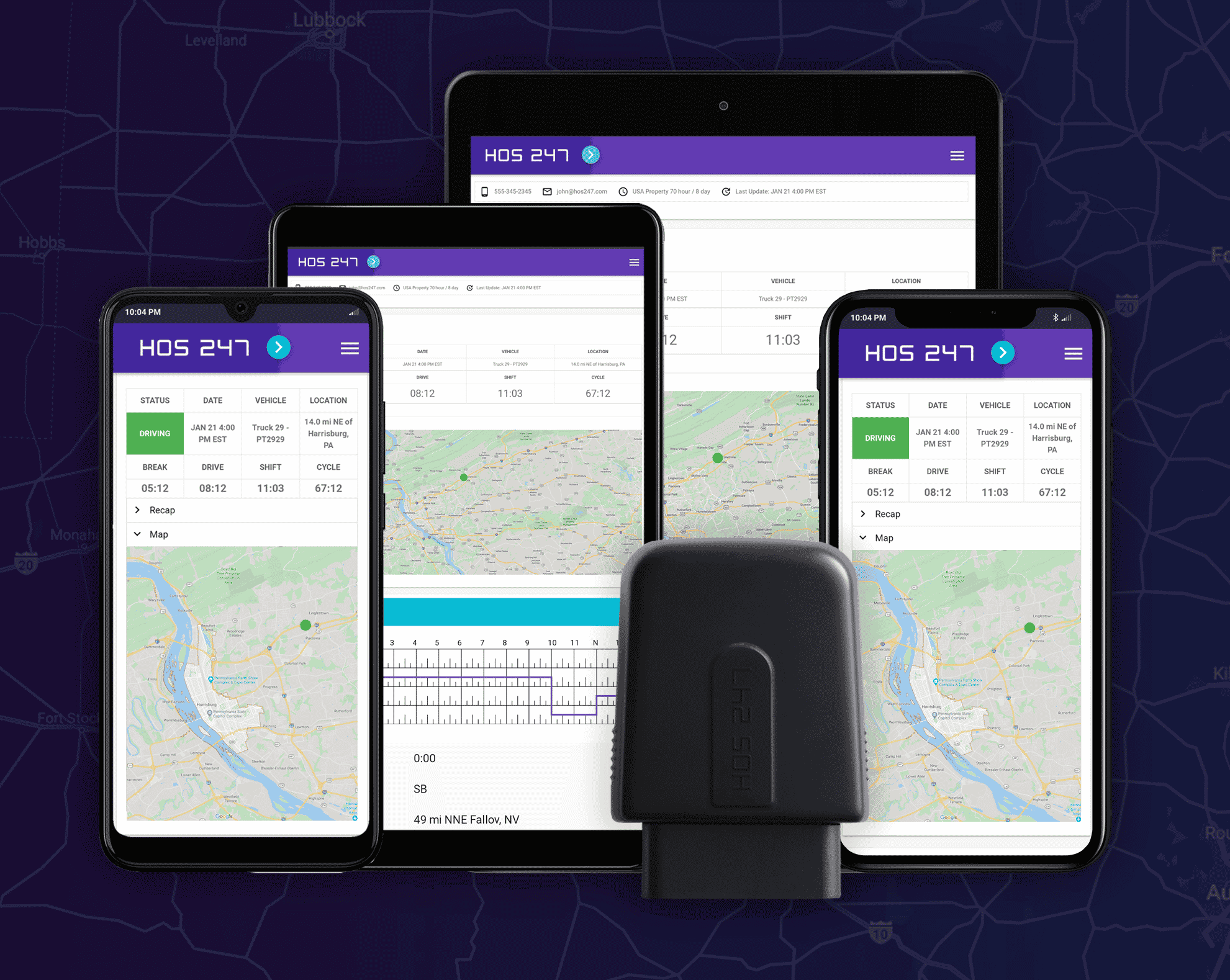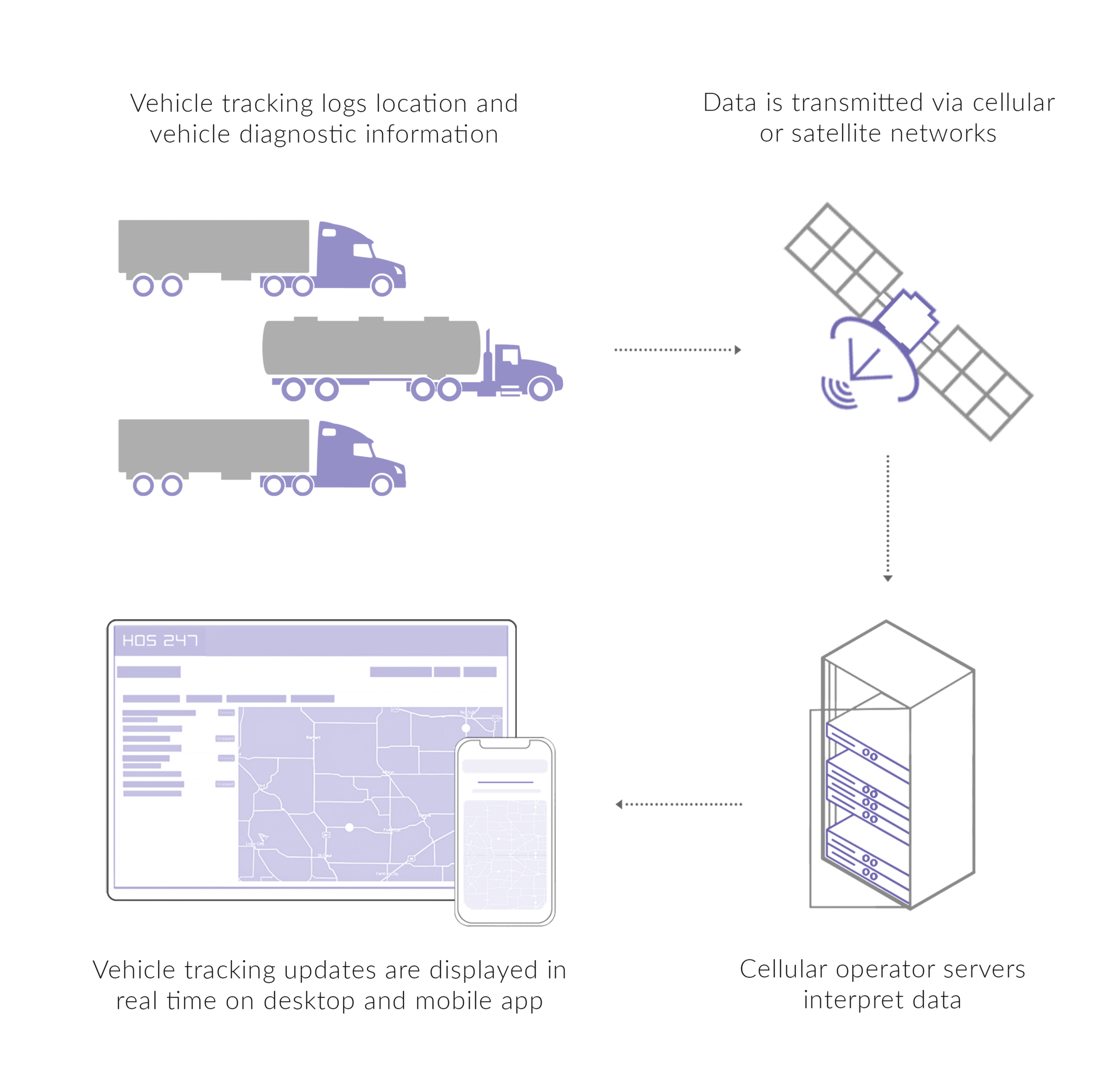GPS technology has become an essential tool in the trucking industry. A GPS fleet management system provides useful information of a fleet’s trucks, including real-time locations, vehicle diagnostics, and much more, allowing carriers to optimize deliveries, load assignments, and other essential processes.
Choosing the right tracking and fleet management system can greatly improve business operations and increase profits. In this article, we will look at some ways you can use a GPS tracking system to optimize fleet management and enhance performance, and we will tell you how to find the best solution for your business.
Do you have any questions? Talk to ELD Advisor: 650-405-3372 or Request Callback
What Is GPS Fleet Management? A Complete Overview
While traditional GPS tracking simply shows where vehicles are located, modern fleet management systems integrate multiple data streams to provide a complete operational picture. By combining Global Positioning System satellites with telematics technology, these systems collect, transmit, and analyze vehicle data in real-time.
Telematics devices installed in trucks communicate with onboard computer systems, gathering information about engine performance, fuel consumption, driver behavior, and vehicle diagnostics. This data is transmitted via cellular networks to cloud-based platforms where fleet managers can access comprehensive dashboards and reports.
This comprehensive approach enables trucking companies to optimize routes, reduce fuel costs, improve driver safety, and maintain regulatory compliance. The difference between basic GPS tracking and full fleet management solutions lies in the depth of data collection and the actionable insights provided. While simple tracking tells you where a vehicle has been, complete fleet management systems help predict where it should go next and how to get there most efficiently.
Fleet management platforms also integrate seamlessly with other business systems, including ELD devices, fuel cards, maintenance scheduling software, and customer relationship management tools. This connectivity creates a unified ecosystem that streamlines operations and reduces administrative overhead.

Key Features Every GPS Fleet Management System Should Have
When evaluating GPS fleet management solutions, trucking companies should prioritize systems that offer comprehensive functionality beyond basic location tracking. The most effective platforms combine multiple features to create a complete operational management tool.
Real-Time Vehicle Tracking and Location History
Comprehensive tracking capabilities form the foundation of any quality fleet management system. Real-time tracking provides instant visibility into vehicle locations, allowing dispatchers to make informed decisions about route adjustments, customer communications, and emergency response. Historical location data helps identify patterns, optimize routes, and provide documentation for customer inquiries or insurance claims.
Driver Behavior Monitoring
Advanced systems monitor driving patterns including speeding, harsh braking, rapid acceleration, and cornering behavior. This data helps identify training opportunities, reduce insurance costs, and improve overall fleet safety. The best systems provide configurable alerts that notify managers of concerning behaviors while offering drivers immediate feedback to encourage safer practices.
Route Optimization and Dispatching Tools
Intelligent routing capabilities analyze traffic patterns, delivery schedules, and vehicle capacities to suggest optimal routes. These tools consider factors like fuel costs, driver hours of service limits, and customer time windows to maximize efficiency. Integration with dispatch systems enables seamless communication between office staff and drivers.
Vehicle Diagnostics and Maintenance Scheduling
Integration with vehicle diagnostic systems provides real-time engine health monitoring, fault code alerts, and predictive maintenance scheduling. This capability helps prevent breakdowns, reduces repair costs, and ensures vehicles remain compliant with safety regulations. Automated maintenance reminders help fleet managers stay ahead of required services.
Fuel Consumption Tracking and Idle Time Monitoring
Detailed fuel usage analysis helps identify inefficient driving habits, optimal refueling locations, and potential fuel theft. Idle time monitoring reveals opportunities to reduce unnecessary engine runtime, leading to significant fuel savings and reduced vehicle wear.
Mobile App Accessibility
User-friendly mobile applications enable drivers to access necessary information while on the road, including route updates, delivery instructions, and vehicle inspection checklists. Managers benefit from mobile access to fleet data, allowing them to monitor operations and respond to issues regardless of location.
Integration Capabilities with Other Business Systems
Modern fleet management platforms should seamlessly connect with electronic logging devices (ELDs), fuel card systems, accounting software, and customer management tools. This integration eliminates duplicate data entry and creates a unified view of business operations.
Customizable Reporting and Analytics Dashboards
Comprehensive reporting tools enable fleet managers to analyze trends, identify improvement opportunities, and demonstrate ROI. The best systems offer customizable dashboards that highlight key performance indicators relevant to specific business goals, from fuel efficiency to driver safety scores.
When selecting a GPS fleet management system, prioritize solutions that combine these essential features into a cohesive platform. A comprehensive feature set ensures maximum return on investment and positions your fleet for continued growth and operational excellence.

HOS247 Is a Top-Rated GPS and ELD Provider
HOS247 has developed a complete GPS fleet management system that works on its own or can be integrated with the electronic logbook. Our top-rated services come with the following benefits:
- No contract-policy. HOS247 understands business conditions can change. Clients can choose a monthly or yearly subscription service and scale their plans as they see fit to suit their specific needs.
- Trial period. For a period of two-weeks, users can get familiar with the elog or GPS fleet management system to experience firsthand how it performs on the road. If they decide to return it within that period, they are entitled to a hassle-free refund.
- Reliable hardware. Our hardware is durable and performs up to standard at all times. Should anything happen, we have a one year replacement policy.
- Top-rated solution. HOS247 is a top rated provider. User reviews show fleet managers and drivers alike are satisfied with our services and appreciate the close relationship with our support team.
- Extra features. To complement the system, HOS247 offers GPS fleet management, idle time tracking, vehicle diagnostics, IFTA mileage calculations, and more.
These foundational benefits make HOS247 an ideal choice for trucking companies seeking reliable fleet management solutions. Let’s explore the specific advantages that set HOS247’s GPS fleet tracking system apart in the competitive fleet management marketplace.
Benefits of the HOS247 GPS Tracking System
There are many providers offering web based GPS software and tracking, and the task of choosing can be overwhelming. GPS is extremely useful and it is worth the time to find a tracking solution that will serve the fleet for the long haul. HOS247 offers a reliable service for trucking companies to help them thrive. Here are some of the most valuable advantages of our GPS fleet management system:
- 4G technology. By integrating 4G technology we have made sure fleets will not be left in the cold when the 3G sunset hits in late 2022.
- Significant savings. The HOS247 GPS system shows efficiency gaps and helps extend vehicles’ useful life. Idling monitoring significantly reduces fuel expenses, which comes in especially handy considering the increasing prices of gas. On top of that, the vehicle maintenance features help keep the fleet in top condition to prevent downtime due to breakdowns.
- Improved safety and security uses. The GPS based fleet management system includes concealed tracking devices to help recover assets in case of theft. It also lets managers know if the vehicle is driven to unauthorized locations.
- Quick and straightforward installation. The HOS247 tracking and fleet management system can be installed in minutes by the driver or fleet manager, and the web based software can be readily downloaded from the internet; no need for a technician.
- Improved customer services. GPS technology makes dispatching much more efficient. Dispatchers can pinpoint drivers and remaining HOS, communicate routes for the quickest delivery and help them avoid delays due to traffic. Clients can receive more accurate ETAs and a backup record of their operations is kept to protect drivers from false claims.
These comprehensive benefits demonstrate why HOS247 continues to earn top ratings from fleet managers and drivers alike. The combination of advanced technology, cost savings, and operational improvements makes HOS247 a smart investment for trucking companies focused on long-term success and competitive advantage.

How to Choose a GPS Fleet Tracking System
A GPS fleet management system needs to meet several standards. To choose a GPS tracker that works for you business, make sure to check for:
- Efficient technical support. Technical assistance is needed at critical moments, so it should be the best available. The GPS tracker should include easy access to your provider and assistance from experts to optimize the use of the system.
- Compatibility. A fleet comprising trailers, light- and medium-duty trucks (that is, fleets with several types of vehicles) should look to find a system with a device that can work with all of them.
- Easy installation. If the installation needs a special process, it will probably mean some downtime and could very well have an extra charge. A quick and DIY installation process is much more convenient.
- Ease-of-use. User-friendly software is vital to the success of a GPS system. Technology on these devices is complex and sensitive; so it must be as easy to manage as possible.
- 4G technology. Most 3G networks are set to be fully phased out by the end of 2022. Choosing a 4G device can save users time and setbacks in the future, not to mention the superior technology.
- Demo or trial period. Because so much can go wrong with the GPS fleet tracking system, it is probably best to test it on the field and see what it can do. Ask potential providers for a demo or trial period before signing anything.
- ELD integration. Fleets that operate across states will benefit from GPS tracker that integrates with an electronic logging system. In this way, the fleet can streamline both processes by having a single provider. Compliance will be much simpler and the staff will only need to learn and use one system.
By evaluating potential providers against these essential criteria, fleet managers can select a GPS tracking system that delivers reliable performance, seamless integration, and long-term value. Taking the time to thoroughly assess these factors upfront will ensure your chosen solution supports your fleet’s operational goals and growth objectives.

GPS Fleet Management for Small vs. Large Trucking Operations
The optimal GPS fleet management solution varies significantly based on fleet size, with different operational priorities and budget considerations driving technology choices. Understanding these distinctions helps trucking companies select systems that align with their current needs while supporting future growth.
Small Fleets (1-25 vehicles)
Small trucking operations typically prioritize cost-effectiveness and simplicity over advanced features. Essential capabilities include basic real-time tracking, simple reporting, and straightforward driver communication tools. These fleets benefit most from systems with low monthly fees, easy installation, and minimal training requirements. Scalability becomes crucial as small operators often experience rapid growth, making it important to choose platforms that can accommodate additional vehicles without requiring complete system changes.
Medium Fleets (25-100 vehicles)
As fleets expand, operational complexity increases significantly, requiring more sophisticated management tools. Medium-sized operations need advanced reporting capabilities to analyze driver performance, fuel efficiency, and route optimization opportunities. Enhanced driver management features become essential, including detailed behavior monitoring, automated coaching alerts, and comprehensive safety scoring. Route optimization tools help maximize efficiency across multiple daily runs, while integration with dispatch systems streamlines communication and scheduling.
Large Fleets (100+ vehicles)
Enterprise-level operations require comprehensive platforms with extensive customization options and dedicated support resources. Large fleets benefit from custom integrations with existing business systems, advanced analytics dashboards, and multi-level user permissions. These operations typically need specialized features like bulk vehicle management, automated compliance reporting, and API access for custom applications. Dedicated account management and priority technical support become essential for maintaining operations across hundreds of vehicles.
Scalability Considerations
Successful fleet management systems accommodate growth without requiring complete platform migrations. Key scalability factors include flexible user licensing, modular feature additions, and robust data handling capabilities. The best systems allow fleets to start with basic functionality and add advanced features as operations expand, ensuring consistent user experience and data continuity throughout growth phases.
Pricing Models
Fleet management providers typically offer per-vehicle pricing or tiered structures based on fleet size and feature requirements. Per-vehicle models work well for smaller operations with predictable growth patterns, while tiered pricing often provides better value for larger fleets requiring comprehensive functionality. Understanding these pricing structures helps operators budget effectively and choose providers that align with their financial planning.
Selecting the right GPS fleet management system requires careful consideration of current operational needs and future growth plans. The most successful implementations balance immediate functionality requirements with long-term scalability, ensuring technology investments support business objectives at every stage of development.
Do Fleets Need ELDs in Addition to GPS Tracking?
The ELD mandate is a federal legislation that applies to millions of drivers of commercial buses and trucks in the United States. Outside of the cases of exception, drivers and carriers required to keep RODS must do so using an ELD system. The regulations include drivers based in Canada, Mexico and the United States, and will soon be mandatory in Canada as well. Fleets composed of vehicles that engage in interstate commerce require electronic logbooks unless one of the following exemptions applies:
- Short-haul exception. Drivers who operate under the short-haul exception may continue to use timecards. RODS are not required in these operations so ELDs are not necessary.
- RODS required for 8 days/month or less. If drivers are only required to keep RODS for 8 days or less in any 30-day period, they can use paper logs.
- Drive-away-tow-away operations. When the vehicle being driven is the commodity being delivered, elogs are not needed.
- Manufacturing date. If the vehicle engine was manufactured before the year 2000, it is not necessary to keep electronic HOS logs.
Understanding these exemptions is crucial for determining your fleet’s compliance requirements. For most interstate commercial operations, combining ELD functionality with GPS fleet management creates the most efficient and compliant solution, streamlining both regulatory compliance and operational oversight through a single integrated system.
How to Know if an ELD Is FMCSA Compliant
As per the regulations, providers are responsible for self-certifying their elog systems and registering them in the FMCSA list of approved certified devices. The FMCSA list of self-certified ELDs is available to the public on the Administration’s website.
However, the Administration does not guarantee that devices in the list are compliant with ELD guidelines. “Self-certification” if an ELD is found to be non-compliant, it may be removed from the list and the authorities will make efforts to notify the public when that happens.means that providers are accountable for ensuring their logbook meets federal standards.
Since there is no verification process on the side of the FMCSA, there is a possibility that registered elogs are not compliant, so users should do some research to make sure their choice of provider meets the quality, reliability and security benchmarks set by the FMCSA and that it truly is the product they are looking for. A great way to verify if a product delivers is checking user reviews on unbiased platforms such as the App Store and Google Play.

Conclusion
GPS fleet management technology has evolved from simple vehicle tracking to comprehensive operational platforms that drive efficiency, safety, and profitability in the trucking industry. Whether managing a small fleet or a large enterprise operation, the right system provides measurable benefits through improved route optimization, enhanced driver safety, reduced fuel costs, and streamlined compliance management.
The key to successful implementation lies in selecting a solution that matches your current operational needs while supporting future growth. HOS247’s flexible, contract-free approach combined with reliable hardware and comprehensive features makes it an ideal choice for trucking companies seeking proven fleet management technology. With our two-week trial period and dedicated support team, you can experience firsthand how modern GPS fleet management transforms daily operations and contributes to long-term business success.
Investing in quality fleet management technology isn’t just about tracking vehicles — it’s about building a foundation for sustainable growth, operational excellence, and competitive advantage in today’s demanding transportation marketplace.

I’ve co-founded, built and managed several transportation-related businesses. Now, I’m a founder and CEO of HOS247 – an AI Transportation Platform for trucking companies, freight brokers and other logistics operations. We are transitioning old-style operations to technology-advanced logistics entities and help them to grow their businesses. ELDs (electronic logging devices), fleet tracking and management 2.0 combined with AI-powered dispatch tools.












Most commercial motor carriers and drivers need to comply with the Electronic Logging Device mandate, but there are some exceptions. This article discusses who is required to comply and why they should make the switch to better electronic logging devices

Many companies look for ways to save money and run their business better. While cutting back on spending helps, there’s another powerful way to improve operations: better fleet management. GPS tracking for fleet vehicles is a tool that can transform

Running a business is challenging, no matter the size. Just like giant companies with hundreds of vehicles in operation, owners of small fleets face similar problems related to inefficient dispatch, lack of visibility, extra fuel expenses, and time-consuming paperwork. Small